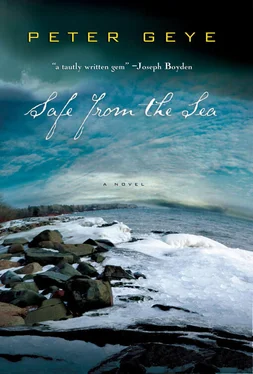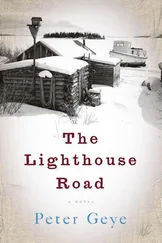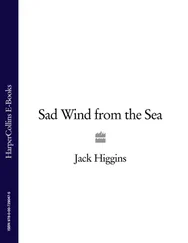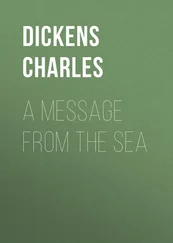“This is an old chart of Superior,” Olaf said, as he tried to catch some of the faint light in order to read a curled-up edge of it. “Right up your alley, come to think of it.”
“Let’s have a look at that.” Noah pushed the mugs and magazines and books on the coffee table to one end.
Olaf fiddled with the knot for a couple of seconds before he gave up and handed it to Noah, who fidgeted with it himself for a moment before biting through the string and unrolling the map on the coffee table. Olaf had grabbed a couple of heavy books from the bookcase and set one at each end of the table to keep the chart from coiling back up.
It was an old Loran-C chart published by the National Oceanic and Atmospheric Administration that Noah recognized at a glance. It covered the north Superior shoreline from Grand Portage Bay, Minnesota, to Shesheeb Point, Ontario, and included the entire Isle Royale archipelago. People were always coming into his shop in Boston hoping that the folded and faded maps they had found in their attics were priceless relics. More often than not, they were just like this one, worth nothing more than what it would cost to mail them.
Olaf had turned a couple of lamps on and sat down knobby-kneed next to Noah on the sofa. “You see here?” he asked, dragging his nub pinky up the length of Isle Royale to its northeastern tip. “These are the Canoe Rocks. And this,” he said, dragging his thumb another couple of inches straight north, “is where we came about, where Jan made the mayday. The wind was coming from there,” he said, stretching his arm toward the dark corner of the great room and then signaling the direction with his thumb by pulling it back toward them, “so you see, the rocks were the first things in our path.
“We came about at ten fifteen, the fire starts at about ten thirty, you factor an hour of powerless drifting in, and we’d have hit the rocks about eleven thirty. From Canoe Rocks we drift a little farther southwest for a half hour or so and sink exactly here,” he said, thumping a black X scrawled on the chart with his thumb.
Noah sat up, retraced the path his father suggested, and leaned in to have a closer look at the sounding marked on the chart. “It says here the water’s only five hundred and eighty-two feet deep. I thought the Rag was deeper than that.”
Olaf pointed at the fine print along the upper edge of the map. “This chart was published in 1964. After the Rag sank, during the investigation they spent a lot of time using sonar equipment and whatnot trying to determine the exact whereabouts of the wreckage. They discovered the original soundings were off a couple hundred feet.”
“No small error,” Noah said.
“Discrepancies on these lake charts only mattered if they were in shallow water, in the harbors and along the coasts. The difference between five hundred and eighty feet and eight hundred feet doesn’t mean much to a boat drafting twenty-five.”
They both sat back and sighed and turned to face each other. After an awkward second Olaf looked away and patted Noah’s knee before trying to stand up. The edge of the couch was lower than the chair, though, and he couldn’t get his legs to lift him. Rather than trying to get up again, he let himself slide back into the cushions.
Noah had stood impulsively and found himself hovering above his father for the second time in as many hours. Instead of lingering this time, he walked around the table and looked for something to distract them from the awkward moment. A couple of seconds seemed like a couple of minutes before he finally grabbed the afghan and spread it over his father’s legs.
“Thanks,” Olaf said, then gestured toward the stove. “Is there room in there for another log?”
Noah opened the stove door, knew another log wouldn’t make any difference. He took one from the wood box and tossed it in. When it hit the smoldering pile already in the stove, the logs collapsed and spread across the bottom of the stove in a bright, pumpkin-orange flash. The new log caught fire immediately.
“Close the damper a bit, too, would you?” Olaf asked.
Noah did. As he stood there within a few feet of the open door, watching the bark on the split oak disappear into ash, he figured the temperature in the cabin must have been at least eighty-five degrees, maybe ninety.
He closed the stove door and went to the kitchen to pour himself a glass of water. “If there was an explosion, isn’t it possible that that was the cause of a rupture in the hull?” Noah asked.
“Sure, sure,” Olaf said. “In fact, I’d be surprised if serious damage hadn’t been done by an explosion, the fire alone, even. But the fatal blow was the rocks.”
“How do you know?”
“It wasn’t more than a couple minutes after I got back on deck that we ran aground,” Olaf said. “Imagine that big boat butting against a line of rocks, each as big as a house. The jolt knocked me right off my feet. We were lucky we’d had time to get ourselves reattached to our lifelines. If we hadn’t, we would’ve been in the water — and probably dead.
“You see, when the boat’s adrift in the open water, the waves are up against a moving target. When the boat’s beached on the rocks, in the shoal water, they’re free to pound whatever’s there. I remember trying to get my feet back under me and the water crashing up over the deck. I didn’t have a whole lot of hope right then, that’s for damn sure.”
“It must have been terrifying,” Noah said, imagining himself in the same situation. “What do you think about at a moment like that?”
Olaf looked at him from the corner of his eye. “Have you ever been in a rumble?” he asked.
“What do you mean? Like a fistfight?”
“Yeah. You and another guy mixing it up.”
“No.”
“I’ve been in one fight,” Olaf said. “In Westby, Wisconsin, of all places. I was sixteen years old. I remember because it was the year I won the ski jumping tournament down there — you won there once, too, didn’t you?” he asked but didn’t wait for an answer. “We were in one of the bars in town after the tournament, and some local guy got it into his head that I was trying to move on his girl — which I probably was.” Olaf smiled. “He cussed me out, and before I knew it, he’d cracked my head with a beer bottle. It wasn’t a clean hit, but it was enough to knock me down. Then he sets to work kicking, punching, crashing bar chairs over my shoulders every time I tried to get on my feet. I didn’t know what in the hell had hit me, but I knew I had to get up. I thought that son of a bitch might’ve been crazy enough to kill me.
“The point is, I’d been getting the shit knocked out of me: the walk across the deck, the time on the open boat deck, running aground and taking that pounding, that all adds up. It would’ve been easy to just cling to that icy deck and hope.”
“Why didn’t you give up?”
“I guess there was some instinct to survive,” Olaf said. “And I knew I probably wouldn’t if I just sat there holding on for dear life.”
“Did you think you were going to die?”
Olaf thought about it for a second. “I don’t suppose I thought I was going to die, no. It was more a matter of thinking I wouldn’t survive. There’s a difference, or it seemed so at the time.
“We were only hung up on the rocks for a couple of minutes, but that was time enough for me to put some perspective on our situation. We had no engine, no engine crew , no steerage, no communication between ends of the ship, no communication at all, with anyone. We were thirty miles from safe harbor, stuck on a rock in the middle of Lake Superior, it was below zero, a near whiteout, with fifteen-foot waves. And we were already soaked to the bone.
Читать дальше












